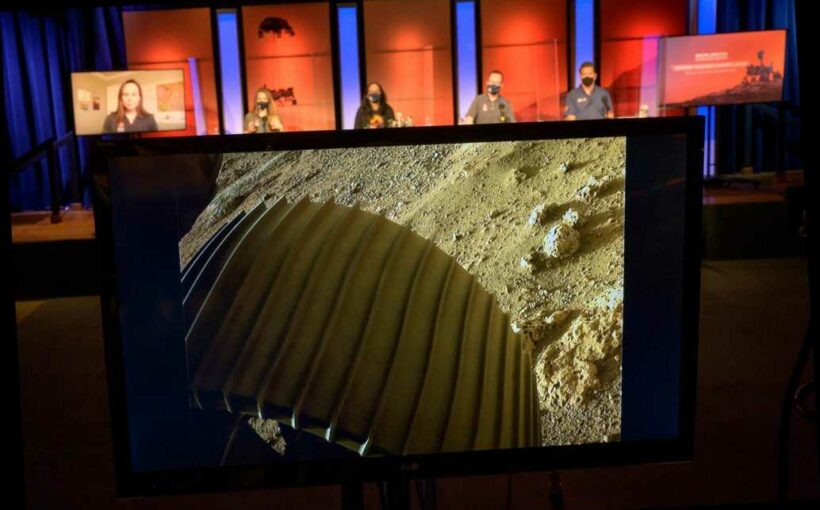More On:
mars
NASA’s Perseverance successfully lands on Mars
Mars rover landing: Watch NASA’s Perseverance touch down live
Bosnia village with link to Mars enthralled by rover landing
Nestlé to launch a new, vegan version of its KitKat bar
NASA’s Perseverance Rover has released its first full-color look at Mars a day after its successful landing — and scientists are fascinated by the rocks it captured on the Red Planet.
Researchers hope the small rocks filled with holes seen next to one of Perseverance’s six wheels holds the key to finding evidence of life on Mars, as the rover prepares for the next stage of its historic mission.
“I love rocks. Look at these right next to my wheel. Are they volcanic or sedimentary? What story do they tell? Can’t wait to find out,” the optimistic robot tweeted Friday.
At a press conference Friday afternoon, NASA scientists echoed the excitement of finding out.
The answer will help determine the region’s geology and past climate — including if life might have once existed beyond Earth.
“If these are volcanic rocks, we are incredibly excited about that from a Mars sample return perspective because we can really nail that age date with a sample from a volcanic rock,” said Katie Stack Morgan, deputy project scientist.
“We know for sure absolutely that there are sedimentary rocks in [nearby] Jezero Crater that were likely habitable,” Morgan added.
The Jezero Crater where Perseverance landed is believed to be between 3.8 and 3.9 billion years old — at a time when water was believed to be on Mars.
NASA hopes to be able to send a slew of additional images to Earth by the end of the weekend, and officials said the rover is on track to be able to start driving and exploring its environment by the end of the month.
By April, scientists hope Perseverance can find a suitable launch site for its mini-helicopter.
The rover is expected to stay on the Red Planet for several years to gather data and harvest samples, in an effort to ultimately prepare for human exploration.
Perseverance’s sophisticated weather instrument will measure pressure, temperature, wind speed and humidity on the planet, which NASA said will benefit future astronauts.
“Really that investigation is on the rover for the purposes of preparing for future human exploration, and letting us know what the modern Martian environment is,” Morgan said.
Researchers said although there are years of work ahead, the success of the first wave of the mission had them “on cloud nine” and in a “weird, dreamlike state.”
Mars 2020 Chief engineer Adam Steltzner said Thursday’s landing was the result of an “epic effort” that represents eight years and “over 4000 human years of investment” — and the images that it has already produced are a pivotal chapter in human history.
“It’s exhilarating, it’s absolutely exhilarating and it is evocative of those other images from our experience as human beings, moving out into another solar system, those images that bring us into the process of our exploration,” Steltzner said at the press conference.
“And I’m so happy that we can contribute another to that collection.”
Share this article:
Source: Read Full Article



